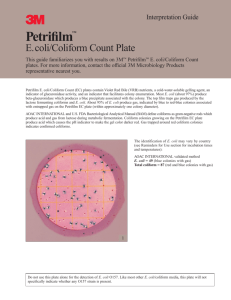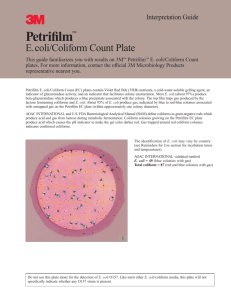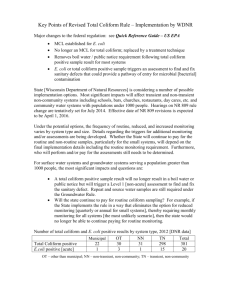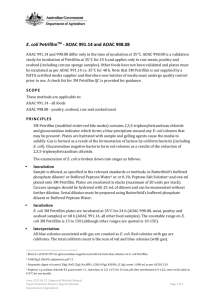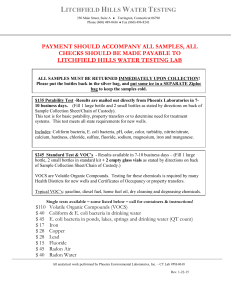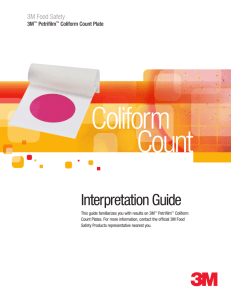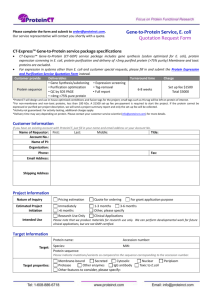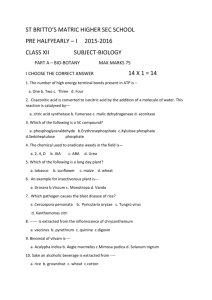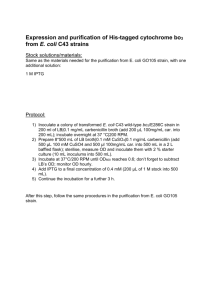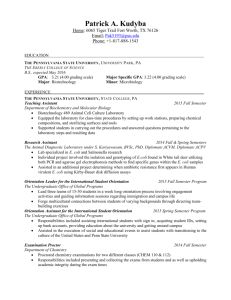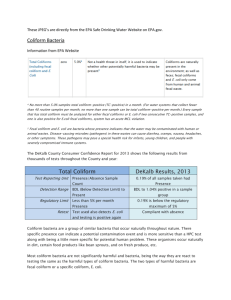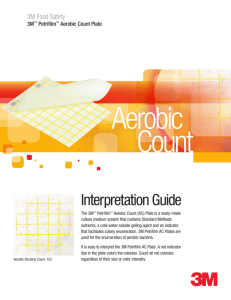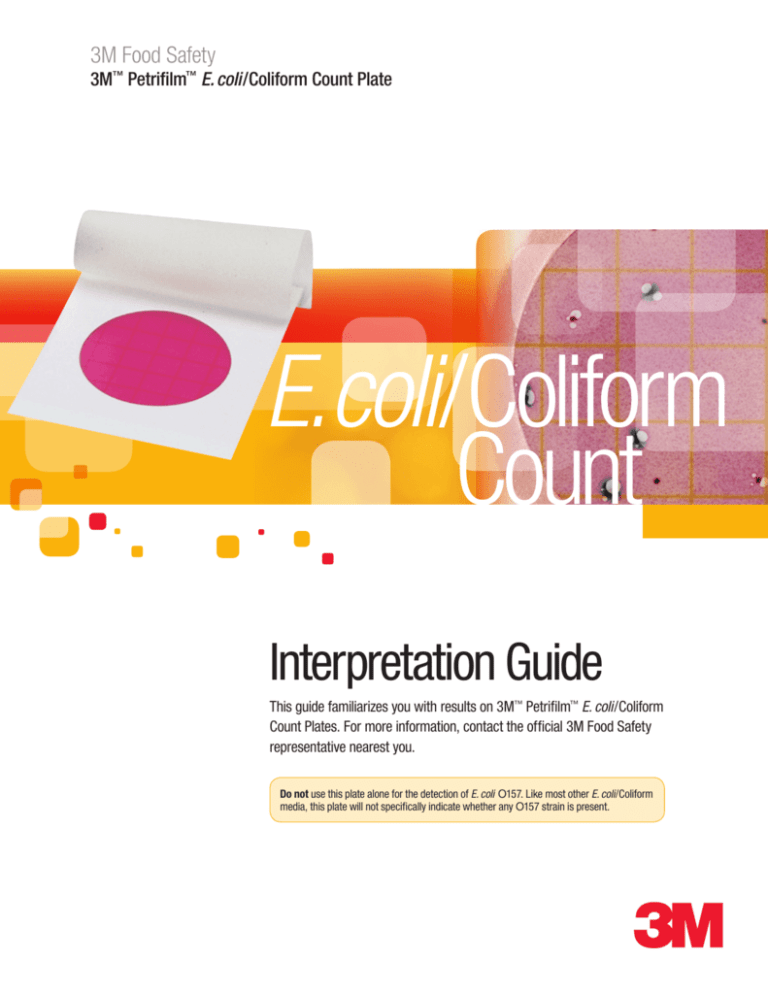
3M Food Safety
3M™ Petrifilm™ E. coli/Coliform Count Plate
E.coli/Coliform
Count
Interpretation Guide
This guide familiarizes you with results on 3M™ Petrifilm™ E. coli/Coliform
Count Plates. For more information, contact the official 3M Food Safety
representative nearest you.
Do not use this plate alone for the detection of E. coli O157. Like most other E. coli/Coliform
media, this plate will not specifically indicate whether any O157 strain is present.
Interpretation Guide: 3M™ Petrifilm™ E. coli/Coliform Count Plate
3M™ Petrifilm™ EC Plate Overview
3M™ Petrifilm™ E. coli/Coliform Count (EC) Plates contain Violet Red Bile (VRB)
nutrients, a cold-water-soluble gelling agent, an indicator of glucuronidase activity,
and an indicator that facilitates colony enumeration. Most E. coli (about 97%)
produce beta-glucuronidase which produces a blue precipitate associated with the
colony. The top film traps gas produced by the lactose fermenting coliforms and
E. coli. About 95% of E. coli produce gas, indicated by blue to red-blue colonies
associated with entrapped gas on the 3M Petrifilm EC Plate (within approximately
one colony diameter).
U.S. Food and Drug Administration Bacteriological Analytical Manual (FDA-BAM)
define coliforms as Gram-negative rods which produce acid and gas from lactose
during metabolic fermentation. Coliform colonies growing on the 3M Petrifilm EC
Figure 1
Plate produce acid which causes the pH indicator to make the gel color darker red.
Gas trapped around red coliform colonies indicates confirmed coliforms.
E. coli count = 49 (blue colonies with gas)
Total coliform count = 87 (red and blue colonies with gas)
SM
3 3of Analysis
Validated through AOAC® Official Method
3
program. The1confirmation of E. coli may vary by country.
4
1
1
4
2 2
Bubbles
3 33
1 11
4 44
The illustrations below show examples of various bubble patterns associated
with gas producing colonies.
All should be enumerated.7
5
2 22
1
8
8
8
8
4
8 8
8
6 6
6
7
7
5 55
6 66
7 77
9 9
1010 10
9
4
7
6
9
9
9
9
7
7
6
6
6
5
5
2
5
5
5
2
4
4
3
2
2
5
3
3
3
1
1
1
4
2
9 99
10 1010
7
10
10
10
8 88
10
2
1
3
Figure 3
Figure 2
Total coliform count = 3
Total coliform count = ~150
Food particles are irregularly shaped and are not associated
with gas bubbles.
Bubble patterns may vary. Gas may disrupt the colony so that the colony
“outlines” the bubble. See Circles 1 and 2. Artifact bubbles may result
from improper inoculation or from trapped air within the sample. They are
irregularly shaped and are not associated with a colony. See Circle 3.
User’s Responsibilities: 3M Petrifilm Plate performance has not been evaluated with all combinations of microbial flora, incubation conditions and food matrices. It is
the user’s responsibility to determine that any test methods and results meet the user’s requirements. Should re-printing of this Interpretation Guide be necessary, user’s
print settings may impact picture and color quality.
2
3M™ Petrifilm™ E. coli/Coliform Count Plate Interpretation
1
1
Figure 5
Figure 4
No growth = 0
E. coli count = 13
Total coliform count = 28
Notice the changes in gel color in Figures 4 through 10. As the E. coli
or coliform count increases, the color of the gel turns to dark red or
purple-blue. Background bubbles are a characteristic of the gel and are
not a result of E. coli or coliform growth. See Square 1.
Back
Lighting
Front
Lighting
1
Figure 6a
The recommended counting limit on a 3M Petrifilm EC Plate is 150 colonies.
Do not count colonies that appear on the foam barrier because they are
removed from the selective influence of the medium. See Circle 1.
2
Figure 6b
Figure 7
E. coli count = 3
E. coli count = 17
Estimated total coliform count = ~150
Any blue in a colony (blue to red-blue) indicates the presence of E. coli.
Front lighting may enhance the detection of blue precipitate formed by
a colony. Circle 1 shows a red-blue colony counted using back lighting.
Circle 2 shows the same colony with front lighting. The blue precipitate
is more evident in Circle 2.
The circular growth area is approximately 20cm2. Estimates can be made
on plates containing greater than 150 colonies by counting the number of
colonies in one or more representative squares and determining the average
number per square. Multiply the average number by 20 to determine the
estimated count per plate.
User’s Responsibilities: 3M Petrifilm Plate performance has not been evaluated with all combinations of microbial flora, incubation conditions and food matrices. It is the
user’s responsibility to determine that any test methods and results meet the user’s requirements. Should re-printing of this Interpretation Guide be necessary, user’s print
settings may impact picture and color quality.
3
TNTC (Too Numerous to Count) To obtain a more accurate count, dilute the sample further.
Figure 9
Figure 8
Actual count = ~106
Actual count = ~108
3M Petrifilm EC Plates with colonies that are TNTC have one or more
of the following characteristics: many small colonies, many gas bubbles
and a deepening of the gel color from red to purple-blue.
High concentrations of E. coli may cause the growth area to
turn purple-blue.
Figure 11
Figure 10
Presumptive E. coli count = ~8
Estimated total coliform count = ~108
Actual count = ~108
When high numbers of non-coliform organisms such as Pseudomonas
are present on 3M Petrifilm EC Plates, the gel may turn yellow.
When high levels of coliforms are present (>108 ), some strains of E. coli
may produce less gas and blue colonies may be less definitive. Count all
blue colonies without gas and/or blue zones as presumptive E. coli. Pick
blue colonies without gas and confirm if necessary.
User’s Responsibilities: 3M Petrifilm Plate performance has not been evaluated with all combinations of microbial flora, incubation conditions and food matrices. It is
the user’s responsibility to determine that any test methods and results meet the user’s requirements. Should re-printing of this Interpretation Guide be necessary, user’s
print settings may impact picture and color quality.
4
Reminders for Use: 3M™ Petrifilm™ E. coli/Coliform Count Plate
Storage
™
Coliform
Petrifilm E. coli/
™
Petrifilm E. coli/Coliform
≤8°C
1
Store unopened pouches of plates at <8°C
(<46°F). Use before expiration date on package.
In areas of high humidity where condensate may
be an issue, it is best to allow pouches to reach
room temperature before opening.
m
™
Petrifilm E. coli/Colifor
2
To seal opened pouch, fold end over and
tape shut.
3
To prevent exposure to moisture, do not
refrigerate opened pouches. Store resealed
pouches in a cool, dry place. Use plates within
one month after opening. Avoid exposure of plates
to temperatures >25°C (>77°F) and/or relative
humidity >50%.
5
Add appropriate quantity of one of the following
sterile diluents: Butterfield’s phosphate buffer
(IDF phosphate buffer, KH2PO4 @ 0.0425 g/L,
adjust to pH 7.2), 0.1% peptone water, peptone
salt diluent (ISO method 6887-1), buffered peptone
water (ISO 6887-1), saline solution (0.85–0.90%),
bisulfite-free letheen broth or distilled water. Do
not use buffers containing citrate, bisulfite or
thiosulfate; they can inhibit growth.
6
Blend or homogenize sample per current
procedure. For optimal growth and recovery of
microorganisms, adjust the pH of the sample
suspension to 6.6–7.2:
• For acidic products, adjust the pH with 1N NaOH
• For alkaline products, adjust the pH with 1N HCl
8
With 3M™ Electronic Pipettor or equivalent held
perpendicular to plate, place 1mL of sample or
diluted sample onto center of bottom film.
9
Roll top film down onto sample gently to prevent
pushing sample off film and to avoid entrapping
air bubbles. Do not let top film drop.
11
Gently apply pressure on 3M Petrifilm Spreader
to distribute inoculum over circular area before
gel is formed. Do not twist or slide the spreader.
12
Lift 3M Petrifilm Spreader. Wait a minimum of
1 minute for gel to solidify.
Sample Preparation
4
Prepare a dilution of food product.* Weigh or
pipette food product into an appropriate
container such as a stomacher bag, dilution bottle,
Whirl-Pak® bag, or other sterile container.
*See Petrifilm Use with Dairy and Juice Products sheet
for recommended dilutions.
Inoculation
7
Place 3M Petrifilm E. coli/Coliform Count Plate
on level surface. Lift top film.
10
With flat side down, place 3M™ Petrifilm™
Spreader on top film over inoculum.
5
Reminders for Use: 3M™ Petrifilm™ E. coli/Coliform Count Plate cont.
Incubation
Interpretation
13
14
Incubate plates with clear side up in stacks of up
to 20 at time and temperature listed below. It may
be necessary to humidify incubator to minimize
moisture loss.
3M Petrifilm E. coli/Coliform Count Plates can be
counted on a standard colony counter or other
illuminated magnifier. Refer to the Interpretation
Guide section when reading results.
15
Colonies may be isolated for further identification.
Lift top film and pick the colony from the gel.
Incubation Time and Temperature Vary by Method
Most common approved methods:
AOAC® Official Method 991.14
• Coliforms: Incubate 24±2 hours at 35°C±1°C
• E. coli: Incubate 48±2 hours at 35°C±1°C
AOAC® Official Method 998.08
• Coliforms and E. coli (for meat, poultry and seafood): Incubate 24±2 hours at 35°C±1°C
NMKL Method 147.1993
• E . coli: Incubate 48±2 hours at 37°C±1°C
For detailed CAUTIONS, DISCLAIMER OF WARRANTIES/LIMITED REMEDY and LIMITATION OF 3M LIABILITY,
STORAGE AND DISPOSAL information and INSTRUCTIONS FOR USE, see Product’s package insert.
3M Food Safety
3M Center,
Building 275-5W-05
St. Paul, MN 55144-1000
USA
1-800-328-6553
www.3M.com/foodsafety
3M Canada
Post Office Box 5757
London, Ontario N6A 4T1
Canada
1-800-328-6553
3M Food Safety offers a full line of products to accomplish a variety
of your microbial testing needs. For more product information, visit us
at www.3M.com/foodsafety or call 1-800-328-6553.
3M and Petrifilm are trademarks of 3M. Used under license in Canada.
AOAC is a registered trademark of AOAC INTERNATIONAL. Whirl-Pak is a registered trademark of Nasco.
Please recycle. Printed in U.S.A. © 3M 2014. All rights reserved. 70-2008-4574-4 (Rev-1114)

